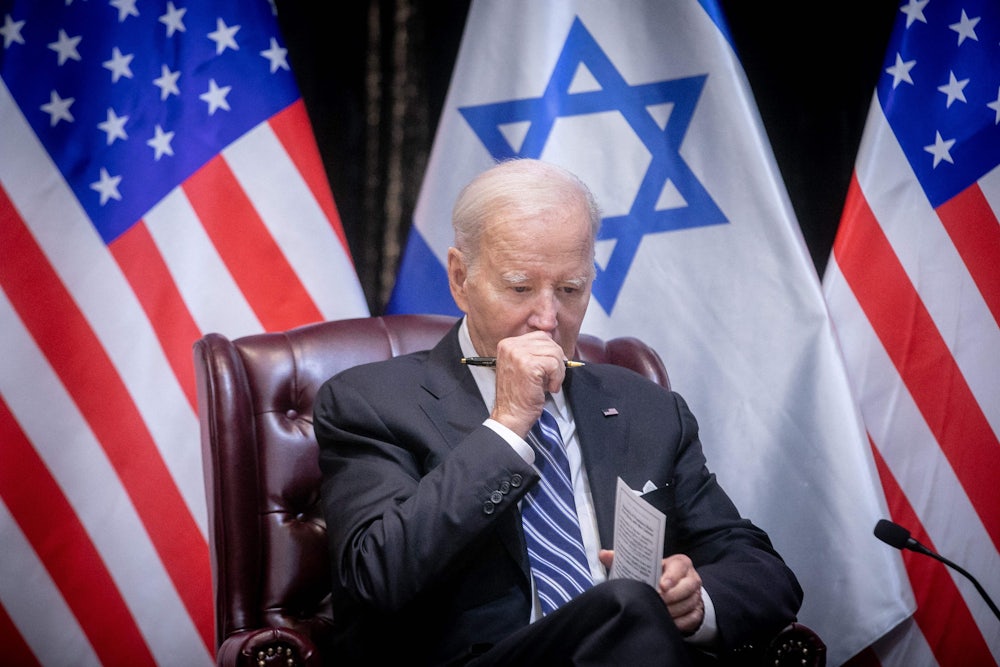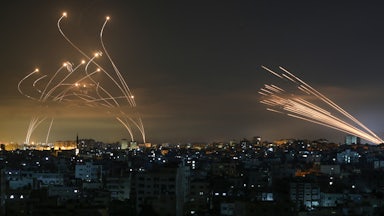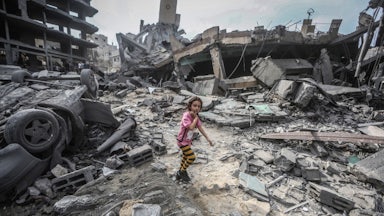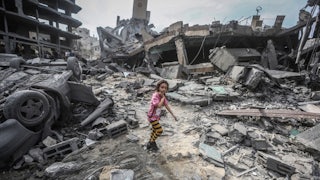For more than two weeks now, my phone has been buzzing relentlessly with notifications alerting me to news from my family back in Gaza. The last thing I do before going to bed—and the first thing I do when I wake up in the morning—is to check if they are alive or dead.
Gaza is where I spent half my childhood, swinging on my grandfather’s ancient sycamore fig tree before it was razed to the ground by Israeli armored bulldozers, stealing nibbles of fresh green wheat from the neighbor’s farm, and swimming at its wild Mediterranean coast. It is where I raised my young son as a new mother, where my parents were both born and married, and where my entire extended family still resides.
On the second day of Israel’s attack, my entire neighborhood of Rimal—Gaza’s commercial hub, including the neighborhood park I would frequently take my son to—was flattened before my eyes on live television by Israeli warplanes.
As of October 30, more than 8,309 Palestinians have been killed so far by Israel’s occupying army, an estimated 70 percent of these casualties women and children, with thousands critically injured and an additional hundreds more buried under the rubble, according to the Palestinian Health Ministry and Defense for Children International. By the time you read this, those numbers will go up as the Israeli ground invasion grinds on.
As much of the world watches in horror, Israel is once again committing atrocities in Gaza, this time on a scale never before seen, depriving a captive, overwhelmingly refugee population of water, food, and power in an open act of collective punishment, weaponizing humanitarian aid and forcibly transferring the population. Most dreadfully of all, this is happening with the U.S. government’s political, financial, and military support and encouragement, at great cost to America’s reputation and credibility both domestically and abroad.
If an all-out conflagration in the region and perhaps beyond is to be avoided, the United States and other Western governments that have pledged unwavering support to Israel’s far-right government would be well advised to reverse course—not merely to urge caution and delay, as President Biden has done in discussions with Prime Minister Benjamin Netanyahu, but to push for an immediate cease-fire. This needs to go hand in hand with a fundamental shift in the U.S. approach to the question of Palestine, to address the underlying causes of the violence: Israel’s decades-long oppression of the Palestinian people and its virtual impunity in doing so.
My father’s side of the family resides in Gaza City, while my mother’s side of the family calls the southern Gaza town of Khan Younis home. We do our best to stay in contact throughout the day with cell phones they charge using car batteries. Sometimes their updates are frenetic, a harrowing summary of the day’s events I missed when I try to sleep. Time is a precious commodity, and the news from loved ones keeps rolling in.
New bombings. Closer this time. A tree fell on the house. Our neighbor’s house was hit. Many trapped under rubble. A hospital just bombed. The bakery, too. More families wiped out—the Abadalah family, remember them? We may not survive the night. But we feel better today. We ran out of water. We need to clean ourselves of the stench of blood and bomb debris and broken lives. Then we had cake—don’t ask how. A birthday for our 9-year-old. We insist on celebrating life.
My uncle Omar’s family in Gaza City have made the difficult decision to remain in their home, despite Israeli orders for Palestinians in that part of the Strip to leave (where to, no one knows), a move that U.N. experts consider to be a crime against humanity. They tried to flee, they told me in a somber WhatsApp message, but ultimately decided to turn back and risk dying “in the dignity of their own homes” after hearing the news of over 70 Palestinians being killed in Israeli attacks as they attempted to make that same journey that day on a road that Israel said was a safe passage. Unrelenting, the Israeli military dropped fliers over their homes telling them that by choosing to stay, they may be considered “members of a terrorist group.”
There are three truths I have had to contend with over the past two weeks. The first: I no longer spend my days and nights worrying about what resources my family has to survive but whether they will survive at all. The second: There is no safe place in Gaza right now, no bomb shelters, and no escape. Gaza is sealed off from the outside world, and everyone and everything is a target of a systematic and deliberate campaign of destruction, not self-defense, according to satellite imagery that is consistent with the Israeli military’s Dahiya Doctrine—or the use of massive military force intended to inflict disproportionate death and destruction, a response that is also considered in international circles to be a war crime.
This is supported by statements that Israeli officials themselves have made. (“The emphasis is on damage, not accuracy,” said one Israeli Army spokesperson.) The third: Our government is complicit in the unspeakable horrors unfolding before us, going so far as to block a resolution condemning violence against all civilians and calling for “humanitarian pauses” in the shelling to allow aid to enter Gaza, and directing State Department staff to avoid terminology such as “ending violence” or “restoring calm.”
Officials may regret their failure to start tamping down the violent rhetoric. Over the weekend, Netanyahu ramped it up considerably in a televised address, in which he invoked a passage from the Bible likening Palestinians in Gaza to the Amalekites. That passage, from 1 Samuel 15:3 in the King James version of the Bible, reads: “Now go and smite Amalek, and utterly destroy all that they have, and spare them not; but slay both man and woman, infant and suckling, ox and sheep, camel and ass.” (Some Biblical scholars cite this passage as an example of “divinely mandated genocide.”)
Biden has made clear, to the detriment of all, that a cease-fire is out of the question for now. After returning from a trip to Israel, Biden pledged an unprecedented additional $14 billion in funding for the Israeli military—already one of the most powerful in the world—in only the second Oval Office address of his term, on top of the $3.8 billion the U.S. already gives it annually. The announcement follows the aforementioned veto of the U.N. Security Council resolution calling for humanitarian pauses.
It bears reminding that the Gaza Strip, a narrow strip of land bordering the Mediterranean, is roughly the same size as the Baltimore metropolitan area, with nearly three times the number of inhabitants. Its Palestinian residents have been subject to an illegal Israeli siege and naval blockade for 17 years, and a violent Israeli military occupation that has segregated them from their lands and their families in other parts of occupied Palestine and from the world for more than half a century.
Palestinians have also been the victims of another, much more sinister stratagem—their deliberate dehumanization. Israeli officials have called them “human animals,” their city “wicked,” their offspring “children of darkness,” and the Biden administration has repeated gruesome lies about beheaded babies that the White House later had to walk back. This racist othering and demonization, echoed by some U.S. politicians and amplified by Biden himself along with numerous media outlets, has had deadly consequences for Palestinians like my family, whose lives by implication matter less and whose killing is justified. It gives Israel the moral pretext it needs to slaughter Palestinians en masse. They are the un-humans to which the laws of war do not apply.
One can only imagine all the apocalyptic ways this latest chapter will turn out. But one thing is certain: We cannot afford a return to a status quo in which Palestinians must choose between being killed, living a life of subjugation under Israel’s brutal apartheid regime, or leaving their homeland—as outlined in an untenable plan put forward by Israel’s notorious finance minister, Bezalel Smotrich. This must be used as a turning point in the way the U.S. approaches Israel and the Palestinians, a radical departure from decades-long policy that has provided Israel unconditional support at the expense of Palestinian rights, freedom, and a just and lasting peace with security for all.
Second, there must be an unequivocal call for an immediate and unconditional cease-fire and a demand for Israel to restore power and water to Gaza and to allow the entry of food and fuel, things it is obligated to do in any case as the occupying power. That the discourse now has to do with touting how many pipelines of water (one) are being reopened in Gaza or how many liters are being allowed in on aid convoys, not why the U.S. dallied in applying pressure over the water being shut off in the first place—a clear crime against humanity that the administration has failed to categorically condemn in its public remarks—is surreal and incomprehensible.
Even so, there are limits to the humanitarian discourse. Biden must also take practical steps to end both the current and long-term blockade on the Strip and allow its residents to move, live, farm, fish, and trade freely, not simply keep it functioning continuously on the “brink of collapse”—as leaked 2011 U.S. diplomatic cables revealed Israel intended to do—and more importantly, address Israel’s system of apartheid domination of Palestinians.
Lastly and most urgently, Biden must move quickly to rein in Israel and its far-right government to whatever extent he can. Giving Netanyahu carte blanche to proceed without restraint would make the U.S. complicit in war crimes. In addition to the massive human toll, the U.S. would lose whatever moral standing it has in the global south and the Middle East, with many already taking note of U.S. double standards and hypocrisy when it comes to similar war crimes committed by Russia’s occupying army in Ukraine and Israel’s occupying army in Palestine.
Almost every Palestinian with family in Gaza right now that I know has set up a kind of one-person command center, dividing their time between fielding media requests, checking in on their family back home, providing comfort to one another at a time when their suffering and truths and even deaths have been denied, searching for unaccounted for family members, all while looking over their shoulders. But the bulk of our time has been spent justifying our humanity to the world and explaining why we don’t deserve to be killed, besieged, bombarded, denied our freedom, and deprived of life’s basic necessities. We do it not because we want to but because we have no choice. And when we finally have a rare moment to breathe and grieve, we are left wondering, how many more Palestinian children need to be killed for Israel to feel sufficiently avenged and for the U.S. to decide enough is enough?










